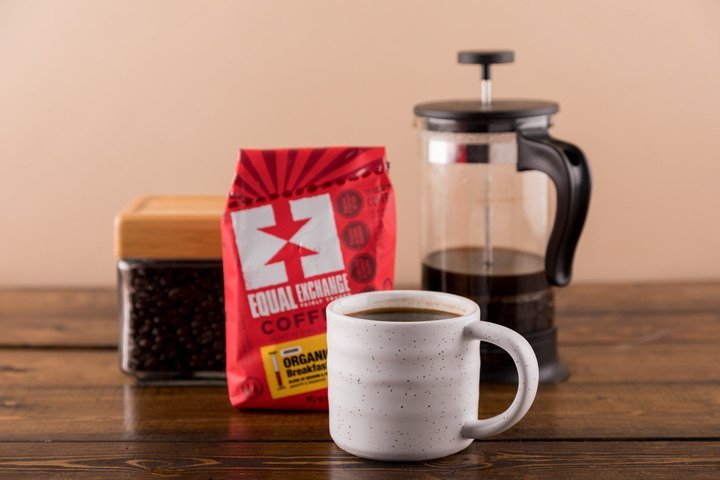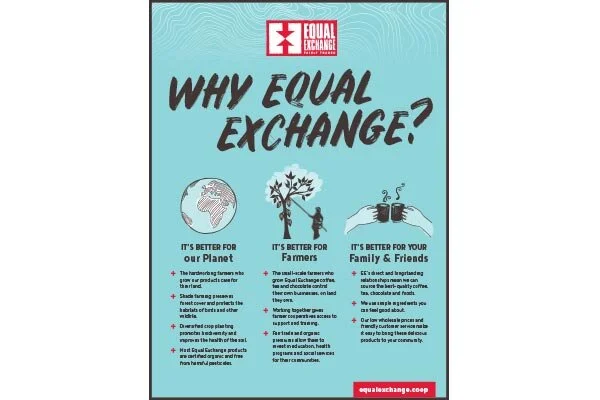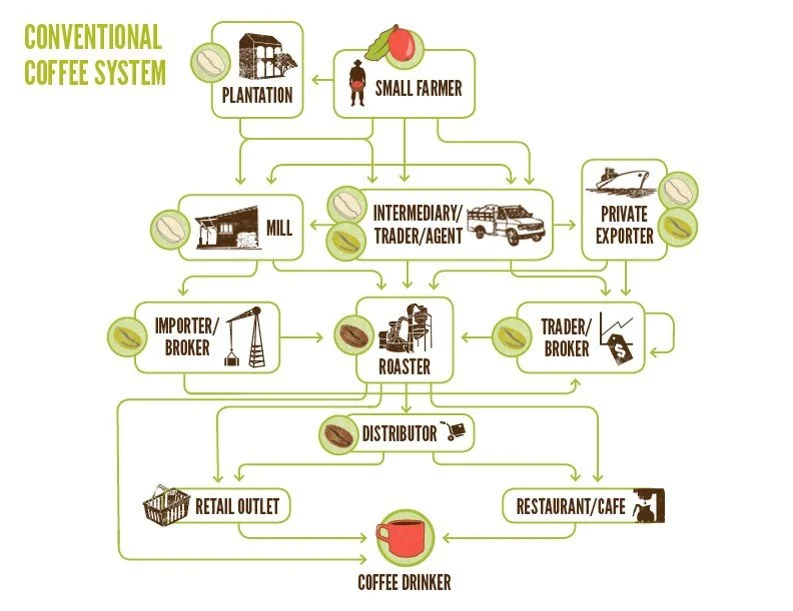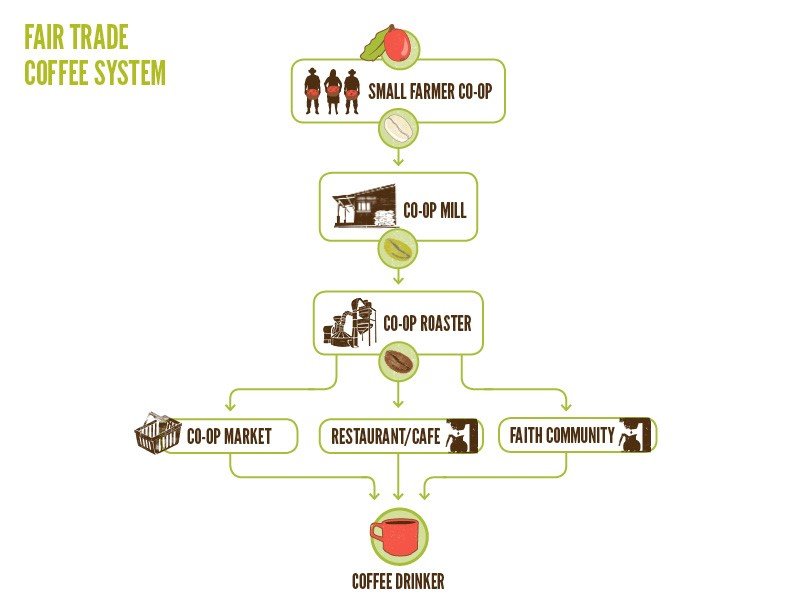Why Switch to Fair Trade, Organic Coffee?
When it comes to drinking ethically-sourced coffee, you have a choice if you’re at home, but how can you get your church, office, or school to start serving Equal Exchange’s organic, fairly traded coffee?
Based on the questions that come up most often, here are talking points to help energize them to take action.
Share this display sign with your group.
“Why should we switch our coffee?”
Equal Exchange coffee is better for farmers, better for the environment and better for those who appreciate high-quality, organically grown coffee. Choosing fairly traded, organic coffee has a real and meaningful impact in all three areas. If your members want to promote social justice, environmental sustainability and fair trading relationships, Equal Exchange offers an affordable way to connect your values with your actions without sacrificing taste and quality.
“Why Equal Exchange over of a different brand?”
Equal Exchange is a worker-owned cooperative started in 1986 with a mission to build long-term trade partnerships that are economically just and environmentally sound, to foster mutually beneficial relationships between farmers and consumers and to demonstrate the contribution of worker cooperatives and Fair Trade to a more equitable, democratic and sustainable world. Is your current coffee company 100% dedicated to doing the same?
Equal Exchange offers organic, ethically sourced products that you can find in natural grocery stores and cafes, but we offer wholesale case pricing so you can access great prices on coffee, tea, chocolate and more for serving and fundraising. Buying from Equal Exchange, who trades directly with small-scale farmer cooperatives, ensures that more of the money you spend on coffee and other products reaches the hardworking farmers who actually grow them. Introduce Equal Exchange’s mission with this 2-minute video:
“Is Fair Trade coffee really that different from non-Fair Trade coffee?”
Fair Trade is a way of doing business that aims to keep small farmers an active part of the world marketplace without being at the mercy of unstable market prices. It’s not charity – it’s a sustainable and alternative trading model that helps producers make a viable living and stay on their own land while advancing many economic, social and environmental goals. Long-term trading relationships mean income that farmers can count on, year after year.
When you buy a fairly traded product it means that a stable price was paid to farmers, significantly higher than the fluctuating market price. By choosing Equal Exchange coffee, you’re supporting a different kind of business model, one without forced child labor that is based on dignity and transparency. Fair Trade premiums allow farming communities to collectively decide which development projects they want to use the money on, like improving access to clean water and education. Small changes we can make surrounding what we choose to consume make a real impact on the quality of the lives of the producers and their families. Read a more in-depth explanation of Fair Trade principles.
“Does it matter if coffee is organic?”
Conventional agricultural products are steeped in synthetic fertilizers, pesticides, herbicides, and fungicides. Not only does the environment suffer from this overload, but so do the people who live and work nearby. Equal Exchange products are certified organic and produced without the use of toxic and persistent pesticides. Many people don’t want to put foods grown with pesticides into their bodies and have concerns for the safety of the farmers and for the future of our planet. For more information, read our blog post: Organic vs. Conventional Coffee.
“I see other Fair Trade coffees at stores. How is buying from Equal Exchange different?”
There’s a big difference! Equal Exchange has been fighting for market access for small-scale farmers from the moment we were founded. We’re a worker-owned cooperative whose mission is tied to building a just food system where consumers have choices and are connected with the people in the supply chains. And Equal Exchange works with other democratically-organized farmer cooperatives. Buying coffee from one of the big guys means supporting a corporation that may have a few Fair Trade products but isn’t 100% dedicated to Fair Trade like Equal Exchange is.
Another difference is quality and freshness! Did you know Equal Exchange expertly roasts our own coffee in Massachusetts daily with a team of quality control professionals? Each batch of coffee is “cupped” to make sure it meets the consistent and high-quality standards we set for our coffees. We seal in the freshness on each package so it arrives directly from us to your door super fresh and delicious! Take a video tour inside our roastery.
“Can we afford Equal Exchange coffee?”
Have our wholesale price list on hand to answer this question directly. Do folks know what they pay per cup of coffee from your current coffee provider? Some of Equal Exchange’s coffee options work out be about $0.12 per brewed cup. You won’t find specialty grade, organic, fairly traded coffee for less. Some groups afford it by collecting spare change near the coffee pot. Others organize a sale of EE products like chocolate and snacks, marking up the costs slightly, and use the profits to cover the cost of their coffee.
“How does it taste?”
We think our specialty-grade, organic coffees are all delicious in their own way, but we welcome you to read reviews from our customers to see which coffees are most popular with customers. If you’d like to speak with someone from Equal Exchange about which roast level is a good fit for you please contact 774-776-7366.
“Why does Fair Trade coffee cost more?”
In most cases Fair Trade products are priced closely to similar high-quality, organic products. At local farmers markets in the US, many people are willing to pay prices that reflect the hard work of small-scale farmers because they know the care that their community members put into the organic cultivation of food on their farms. It makes sense to people that local farmers should make more than what it costs them to grow a product, so, the same concept should apply to products that aren’t grown locally, right? If you’re paying really cheap price for coffee or any other labor-intensive product, there’s a good chance that someone in the supply chain is being exploited.
We believe a shift in perception of value needs to take place in the marketplace. Equal Exchange has been dedicated to creating an alternative trading model since 1986 and we are committed to continuing to build this movement.
“How do small farmers benefit?”
In traditional supply chains, middlemen take the lion’s share of the profits. In Equal Exchange’s case, we ensure that more of the money you pay goes to the farmers because we trade directly with the farmer cooperatives. They are the ones doing the hardest work and taking most of the risk, after all! Actually, by the time you purchase from Equal Exchange, the farmers have already been paid and given pre-harvest financing so they can pay expenses well before products reach the US. A fairly traded product means that the producer has received a guaranteed minimum price for their coffee, regardless of the highs and lows of the commodities market. When the market prices are low, the price a farmer gets for their coffee harvest often doesn’t even cover the cost of production. When the market price is high, Fair Trade premiums paid to farmers increase even higher.
Farmers in the Fair Trade system even get additional premiums paid to their cooperatives because they sell organic products. These premiums go towards projects that the farming communities choose to improve their social, economic, and environmental conditions. Access to clean water, education, and healthcare are basic human rights everyone deserves. Learn more about coffee pricing from Equal Exchange’s coffee buyers.
“Where does Equal Exchange’s coffee come from and who grows it?”
At the heart of Equal Exchange’s story is our relationship with small farmers. We work directly with over 40 small farmer co-operatives in Latin America, Africa, and Asia to bring you high-quality, organic coffee. Learn more about our farmer partners.





